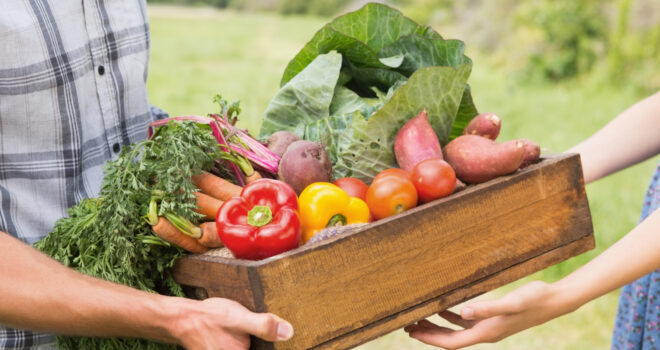A study by the WWF and the Eco2 Initiative showed that French consumers can eat more healthily, while limiting their carbon footprint without having to spend more.
At the rate we are consuming resources in Europe, we will soon need 2.7 planets to meet our needs in terms of food. This alarming finding has already inspired plenty of sustainable eating habits. Because although the consumer is the last link in the food chain, they can help protect the environment by making certain choices.
Sustainable choices, without nutritional or financial sacrifices
This study, which was published by WWF (World Wide Fund for Nature) and the Eco2 Initiative (a group of experts and consultants specialising in sustainable development), suggests you can spend the same, but eat healthier and more nutritious food, while also reducing your carbon footprint.
The researchers came to this conclusion by comparing two shopping baskets, corresponding to the weekly shop for a family of four. One shopping basket was a standard shopping basket, which is that of the average French household. The other, a “flexitarian*” shopping basket, containing:
- More fruit and vegetables
- Fewer sugary soft drinks
- Less meat and wild fish
- More legumes
- Less processed food
- More whole grains
- 50% labelled products
How does the “flexitarian” shopping basket benefit the environment?
Choosing to shop the “flexitarian” way has positive consequences in terms of carbon footprint, but flexitarians also pay less and eat more nutritious food.
- Carbon footprint
Our carbon footprint refers to the amount of greenhouse gases that are emitted during the creation and lifespan of foods. The study highlighted the fact that the “flexitarian” shopping basket reduces the carbon footprint by 38%: the standard shopping basket produces 109 kilos of CO2 a week, compared with just 68 kg CO2 a week for the “flexitarian” option.
- Cost
A “flexitarian” approach would allow you to cut your food spending by 21%. By reducing the cost of their shopping basket, consumers can also buy more certified products. “Flexitarians” spend €190.20 on their weekly shop, or just €3.50 more than the average French household, even though their shopping basket contains 50% organic, Label Rouge and MSC-certified products.
- Nutritional quality
A shopping basket’s nutritional quality is checked based on the Nutri-score. This score ranks products on a scale from A to E, with A corresponding with the most nutritious product while E refers to the least nutritious one. With an A on the Nutri-score scale, the nutritional value of the “flexitarian” weekly shop is higher than that of a traditional shopping basket, which scores a C.



 Fava beans
Fava beans  Chickpeas
Chickpeas  Vegetable garden: growing flageolet
Vegetable garden: growing flageolet 









